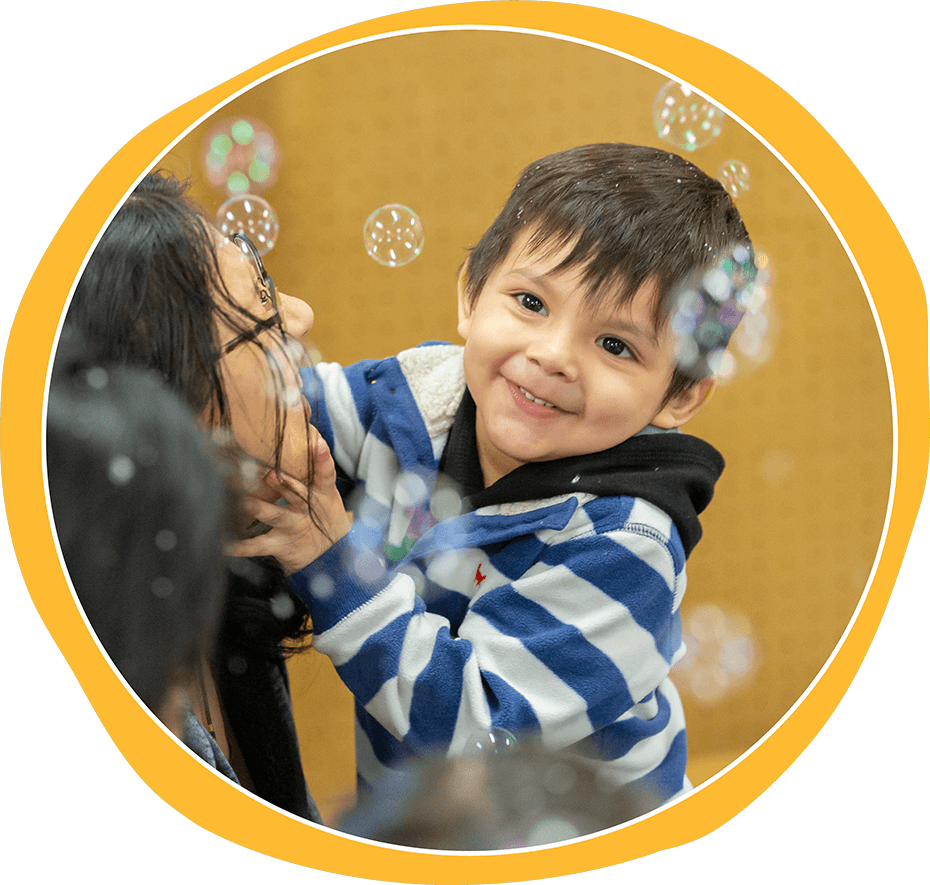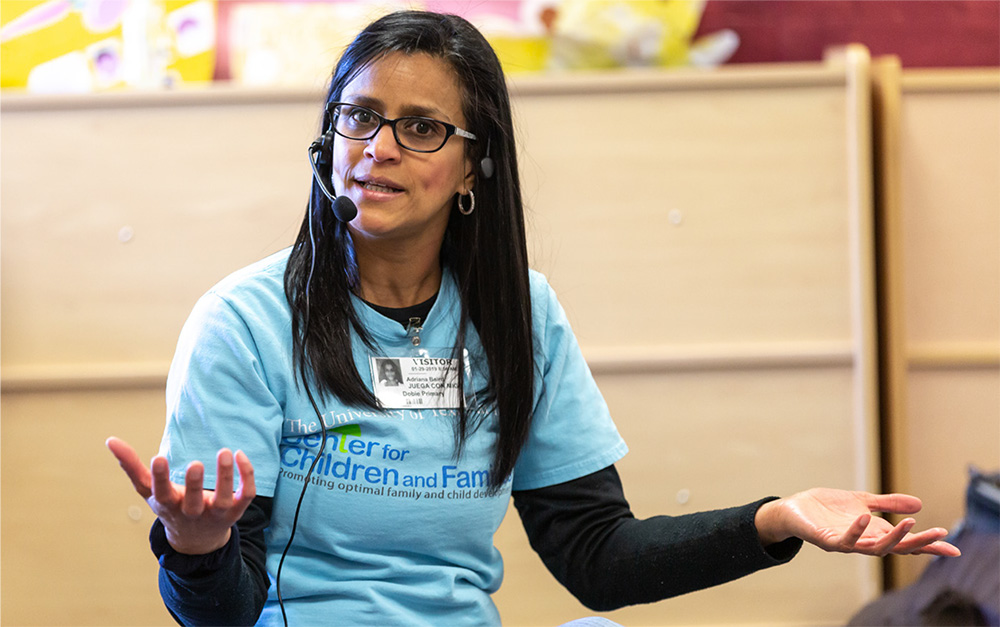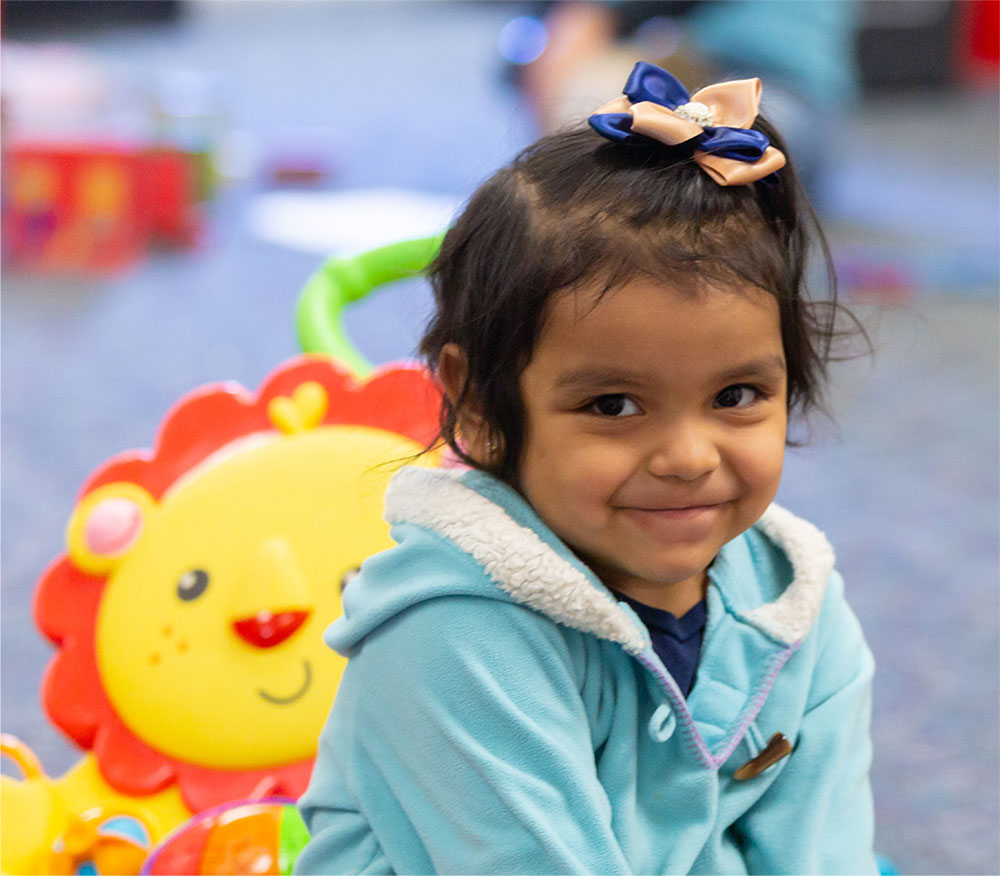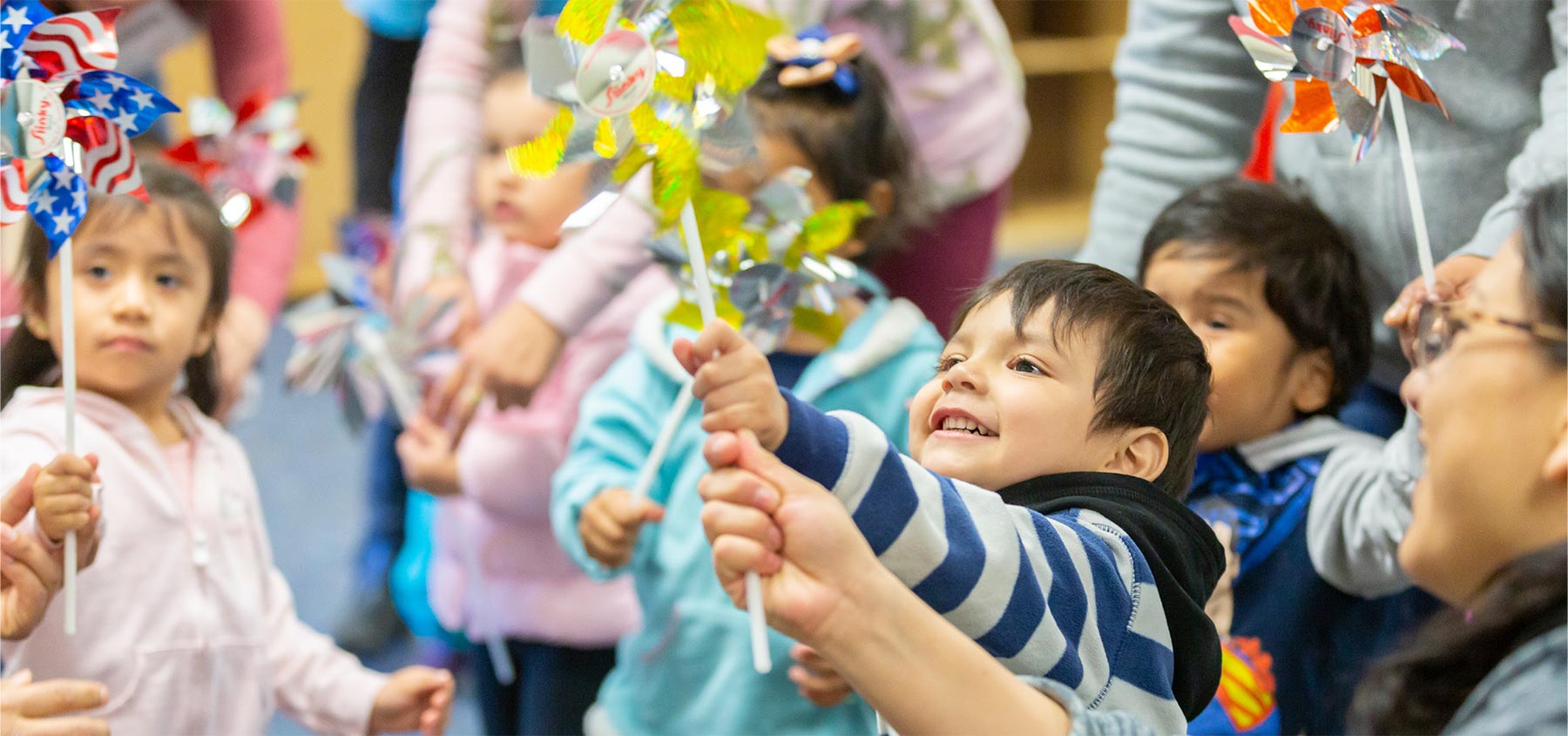
The sound of young children’s voices and their parents’ singing, interspersed with enthusiastic, rhythmic clapping, distinguishes one classroom from the others. Inside, seated in a circle, are a dozen babies and toddlers, each sitting with a parent and all fixated on a singular message.
The lesson is simple: playful learning.
And that lesson, together with parenting conversations that promote nurturing parent-child relationships, has been taught for eight years by Adriana Villa Baird, program director for Juega Conmigo — Spanish for “Play With Me.”
Juega Conmigo is a central component of the outreach programming from The University of Texas at Dallas’ Center for Children and Families (CCF). Now in its 10th year, CCF is celebrating a decade of accomplishments while making plans for its future growth.
Founded in the fall of 2008 by developmental psychologists in the School of Behavioral and Brain Sciences — and with support from a three-year, $350,000 matching grant from the Meadows Foundation — CCF’s mission is to enhance the community’s understanding and application of child development via research, outreach and service.
“We set out to become a recognized, impactful resource for children and families in the community around us,” said Dr. Margaret T. Owen, Robinson Family Professor and CCF director. “We’re doing that by sharing results of our research on children’s development and applying lessons shaped by the research into services for children and their families.”

The center’s initial outreach activities included a spring lecture series, fall forum, a resources and referrals phone line, and developmental screenings for young children — programming that has continued to be offered throughout the past decade. The screenings for developmental delays, provided in English and Spanish, were initially provided when parents sought a screening because they were concerned about their infant’s or toddler’s development. These assessments chart cognitive, language and social-emotional abilities as well as motor skills. They also identify needs for developmental guidance and intervention services.
CCF staff were surprised to uncover an even larger need than they had expected.
“In this first decade, we’ve conducted more than 1,300 developmental screenings,” Owen said. “Nearly 40 percent of the screenings have identified developmental delays or concerns in the children. In turn, we referred one-quarter of the children for intervention services.”
With an initial grant in 2011 from The Dallas Foundation, CCF began providing screenings in both English and Spanish in the activity room at the Bachman Lake branch of the Dallas Public Library. In an effort to attract more parents and spread the word about the value of having a developmental screening for their child, the center decided to have a drop-in playtime for children ages 0 to 3 and their parents or caregivers in the activity room, with attractive toys and fun routines. This sparked the creation of Juega Conmigo.
“We quickly recognized that having all of these children and parents in one room together was a great opportunity to show parents the benefit of playing with their kids,” Baird said.
Using toys, music and movement, Play With Me has grown to include eight sessions each week in five locations for bilingual, Spanish-speaking and English-speaking families.
 Adriana Villa Baird teaches playful learning to preschoolers and their parents at Juega Conmigo.
Adriana Villa Baird teaches playful learning to preschoolers and their parents at Juega Conmigo.“We evolved quickly, developing the program’s structure, curriculum and routines, and we provided a safe space for parents to learn from us and one another,” Baird explained. “We now serve over 550 children and parents annually with this program. It’s been shown to help bring about more positive parenting practices, increase parenting confidence and reduce parenting stress — all leading to children’s healthy development and readiness for school.”
Betania Calles is one of those parents. She brings her 17-month-old twins, Bruno and Fernanda, to Play With Me sessions at a Richardson Independent School District elementary school.
“I bring my children here to interact with other children in a new environment,” Calles said. “They are encouraged to explore, and it helps me understand how they learn.”
Maria Reyes brings her 3-year-old son, Axel, to the same class, where about 10 pairs of parents and children play and learn for 75 minutes every Tuesday.
On a recent visit, Axel, who smiles easily, seemed to relish playing with trucks and bubbles and was delighted to learn with his mom how to make a pinwheel spin.
“He’s learning to follow instructions and play with children his age—his siblings are 7 and 5,” Reyes said. “He’s always happy here.”
The success of the center’s services rests upon the research of affiliated faculty members, whose developmental expertise funnels into the outreach programs. UT Dallas students also gain academic and hands-on experience assisting in the program.
“Our faculty affiliates provide translational research results that we communicate to the community in ways that inform policymakers, guide the work of service providers and educators, and enhance families’ lives,” Owen said.
Owen’s current long-term research project is the Dallas Project on Education Pathways. It has yielded findings that show how various child and family factors influence the development of school readiness and school success of urban minority children.
The study began in 2009 with an initial $1.2 million grant from the Eunice Kennedy Shriver National Institute of Child Health and Human Development, part of the National Institutes of Health. The Dallas Preschool Readiness Project, as it was called then, is one of the nation’s first and longest studies of childhood self-regulation development and its implications among African American and Hispanic children. It is co-led by Owen and Dr. Margaret Caughy, the Georgia Athletic Association Professor in Family Health Disparities at the University of Georgia.
“The first three years of school provide the foundation for virtually all learning that comes after.”Dr. Margaret Owen
The researchers have been following 407 low-income children in the Dallas area since they were 2½ years old. They are studying the factors that contribute to disparities in their acquisition of self-regulation skills, such as the ability to listen, sit quietly, and remember and follow instructions.
The researchers also are tracking how the development of self-regulation skills affects a child’s future academic achievement in reading and math.
“The first three years of school provide the foundation for virtually all learning that comes after,” Owen said. “Entering school with less-well-developed skills can have a lasting impact on academic achievement if a child misses out on these foundational skills.”
In 2017 the researchers received a five-year, $2.8 million renewal grant from the NIH to study the students’ transition into middle school.
“We have seen delays in the development of these skills in many of the children we’ve studied, but we’ve also observed strengths and resilience in a number of the children and their families. These findings hold promise for the development of new programs of support for children at risk in our community,” Owen said.

CCF-affiliated faculty researchers examine a wide range of biological, cognitive, language, social-emotional and cultural areas of development and their implications for families. An essential element of early childhood development is nutrition.
Dr. Shayla Holub, associate professor of psychological sciences, is affiliated with the CCF. Her research focuses on the role parents play in forming children’s eating habits and how dietary patterns evolve in early childhood.
“It’s during the preschool period that children learn to use food to respond to both happy and sad emotions,” Holub said.
She and her colleagues published a study in 2018 in the journal Appetite that demonstrated that children from 4 to 9 years old chose chocolate candy over goldfish crackers more frequently in response to both happiness and sadness.
Their study showed that, when presented with four snacking options, children who were shown sad video clips from Disney’s The Lion King ate more chocolates than children who were shown happy video clips, who in turn ate more chocolates than children who watched neutral video clips.
The study’s results also show that these tendencies increase as children progress in their early school years.
“The developmental differences we saw in our sample suggest that eating in response to emotions is likely socialized by parents and others,” Holub said. “Understanding the role that parents and caregivers play is key to developing interventions to promote children’s health.”
“It’s during the preschool period that children learn to use food to respond to both happy and sad emotions.”Dr. Shayla Holub
Results of UT Dallas research and that of child development experts at other institutions are disseminated through two annual avenues: the fall forum and spring lecture series, both of which have been mainstays of CCF’s programming from its early days.
“Since 2012 our annual forum has offered speakers that promote greater understanding of how children thrive,” Owen said. “We bring together widely renowned psychologists, developmental and educational experts, and local perspectives to engage with the community on issues critical to children’s healthy development.”
CCF also collaborates with UT Dallas’ Callier Center for Communication Disorders at six screening fairs at various high-need community sites, where children are evaluated and, if needed, referred for developmental, vision, hearing and language delays.
“Being able to work with the specialized experts at Callier to provide hearing and language screenings has allowed us to provide screenings that address a fuller array of needs of the children and their families. We’ve also brought in vision screening services for the families attending the fairs,” said Maria Maese, program director of Crece Conmigo, or “Grow With Me,” a program that offers comprehensive developmental screenings for children from birth to age 5.
“It takes a village,” may be a cliché, but for CCF, it is a fact. Funding for the center is provided by a growing number of individuals, corporations and foundations, in addition to considerable support from the School of Behavioral and Brain Sciences. All of the center’s outreach programming is provided at no cost to families, with costs offset by gifts like a recent $50,000 contribution from The Dallas Foundation. All told, nearly one-third of CCF’s budget comes from donations by foundations and individuals.

With a healthy, successful decade behind it, CCF is poised to thrive as it moves into its next stage, with a continued focus on the well-being of the next generation.
“Drawing on the wealth of interdisciplinary child-development research conducted by our faculty and students, and with the visionary leadership of BBS’s former dean, Dr. Bert Moore, we set forth to promote optimal family and child development through research, practice and outreach,” Owen said. “Now, we’re charting our course with a dedication to solving real-world challenges and bringing science-based solutions to families and communities.”










